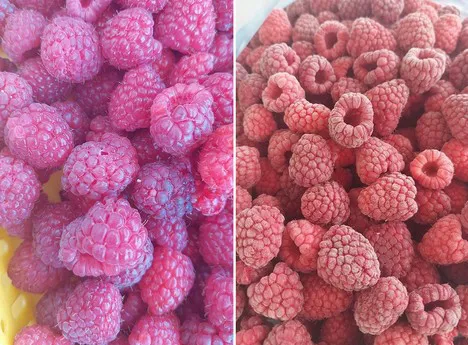European raspberry producers had to struggle with a disastrous harvest in 2021. Balkan expert Andreas Arnold from A&B Fruchthandels in Esslingen informed us that sufficient volumes were available this year, especially from Serbia and other Balkan countries. However, the demand leaves much to be desired.
20,000 tons of frozen raspberries marketed throughout Europe
"Serbia was able to harvest about 75,000 tons of raspberries this year. In addition, there are about 5,000 tons of alternative goods, which, however, are of various qualities. By the end of October, around 20,000 tons of frozen raspberries from Serbia could be sold throughout Europe," Arnold says. "The frozen raspberries are available all year round, it's just that hardly anyone seems to be interested in the product right now. Usually, the season runs from June to June. Meanwhile, however, the contracts just run until the end of the year. In addition, considerable volumes have been delivered to the USA in the past. This year, however, apart from a few shipments of organic frozen raspberries, there have been virtually no exports to the USA. This may be due to the good harvest in Chile."
Competition from the Balkans
In recent years, serious competition has also developed in the Balkan region. "Ukraine has seen some development in frozen raspberries. Kosovo was insignificant for a long time, but climatically it has the same conditions as Serbia and this year it was able to produce about 4,000 to 5,000 tons on about 1,600 hectares. Bosnia did not have raspberries until 15-20 years ago, but now 5,000 to 7,000 tons are marketed from there. Moldova was still able to offer 600 tons this year, but they could hardly sell their goods, probably due in no small part to a lack of information."
Main variety Willamette
Arnold estimates the market share of Serbian frozen raspberries on the German market at 50-60 percent. In any case, Germany is also the most important sales market for frozen raspberries, Arnold said. "The harvest of fresh raspberries was relatively manageable, with a maximum of 100 tons delivered. Willamette is the variety responsible for 90 percent of cultivation and sales in Serbia. The remaining 10 percent is distributed among smaller varieties such as Meeker. This variety has less juice, is more expensive and is sold mainly to countries such as France or more demanding customers," Arnold adds. The main customers for the product are industry, bakeries and other processors.
Demand down 30 to 40 percent
Due to the high price from last year, raspberry sales had already been declining since January 2022, he said. "This is mainly due to the lack of demand in the industry. For example, jam makers have stopped running promotions, while pie makers have tended to switch to strawberries and/or other blends. Even companies offering small 750-gram packs for supermarkets are finding it very difficult to sell their goods." In terms of value, he said, raspberries are the most important product for Serbia, especially since the overall prices for raspberries are higher than for products such as plums. Even though this product, in turn, has a higher harvest volume.
Money problems for Serbian cold stores and growers
"Serbian traders always set their prices with the respective producers before or even during the season. The prices are sometimes written on slips of paper at the cold storage warehouses. At times, the prices were around 4.50 euros/kg, but currently they are 4.00 euros/kg. The cold stores are currently losing money; the only question is how much. The immensely high prices as well as the decreased demand testify to the fact that producers will find it hard to get a decent income."

Normal harvest in Serbia and Poland
"This year, we have a normal harvest in Serbia and Poland, which are among the most important countries as far as frozen raspberries are concerned. Together, they have about an 80-90 percent market share across Europe. But countries such as Bosnia and Kosovo also had a normal harvest," Arnold says. However, sales collapsed because there were simply no alternative outlets. "All you can do is try to market the product at least for a much cheaper price. Given that energy costs have doubled from last year, plus a truckload of raspberries can cost up to 100,000 euros, some growers are happy if they can sell their produce at a rudimentary rate."
Large outflow of labor
According to Arnold, quite a few Balkan countries have a massive problem with the emigration of young, educated people who migrate to Central and Western Europe to study or otherwise find work and are thus not available as harvest workers. "In Serbia, some harvest workers are brought in from India and Pakistan. For cold storage jobs, labor has been scarce for some time. Finding new people is generally very difficult. At least the wages are noticeably higher now."
Furthermore, Arnold points to the difficult logistics situation: "Various firms have been closed down in part because there were simply no trucks available. Of course, this is extremely difficult when it comes to fresh products. Some forwarders do not see any alternatives and expect that a catastrophe might be coming. They see rail transport as the only real alternative here, but that doesn't mean Deutsche Bahn."
Declining sales in the organic market
In his product line, frozen organic raspberries account for about 1 percent. "This year, for the first time, the organic market has seen declining sales. German suppliers are running higher inventories due to uncertainties in the global market, while at the same time the demand is rather sluggish. For some products, annual contracts are no longer agreed on now; goods are negotiated per truckload. The situation is similar for conventional goods: customers only buy what they actually need. This is partly because prices have risen so much in recent weeks," Arnold concludes.
Images: A&B Fruchthandels GmbH
For more information: Andreas Arnold
Andreas Arnold
A&B Fruchthandels GmbH
Heugasse 19
73728 Esslingen
Tel.:+49 711 540 7497
Fax:+49 711 540 7499
info@abfruchthandel.de
http://www.abfruchthandel.de
